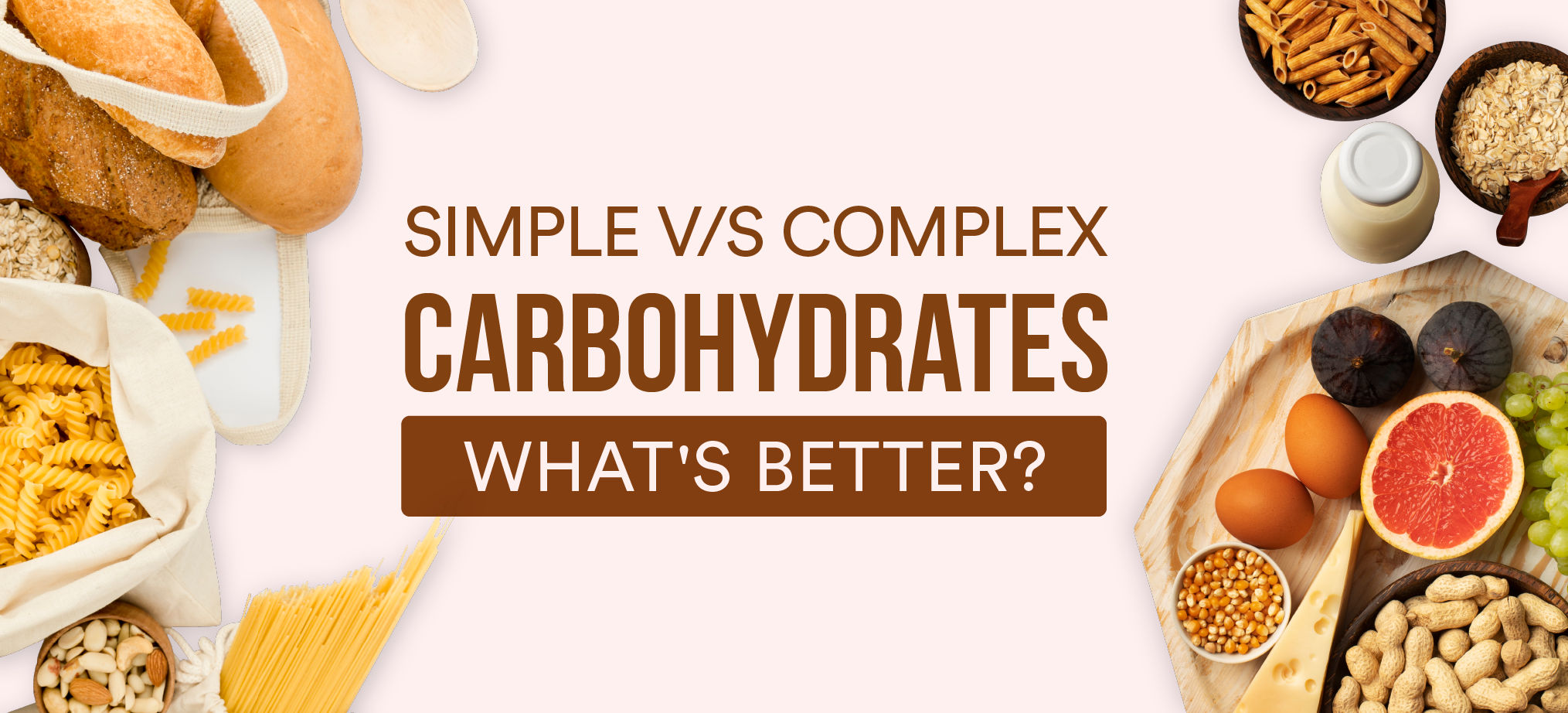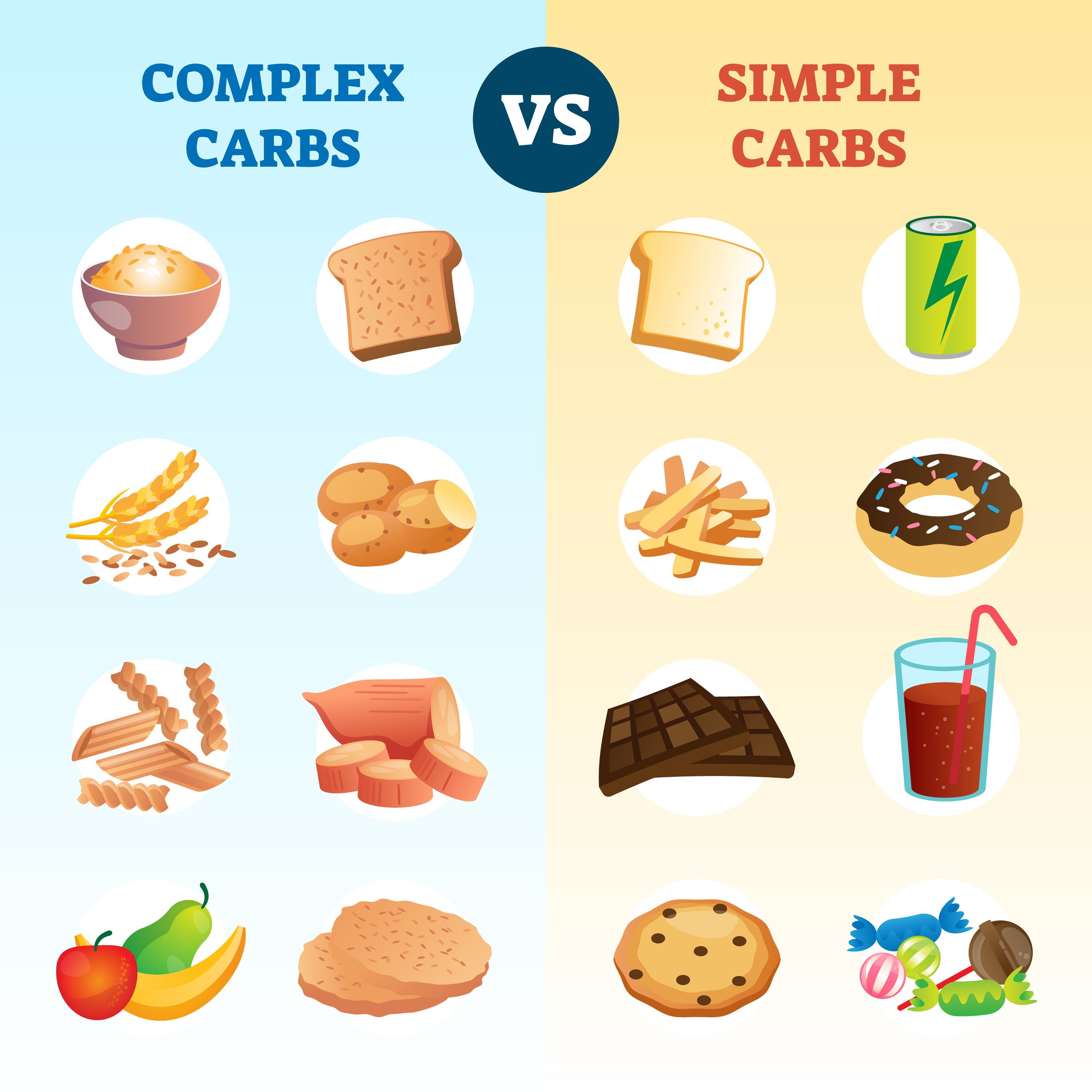General Health
Simple Carbohydrates vs. Complex Carbohydrates: Knowing the Difference
5 min read
By Apollo 24|7, Published on - 13 September 2023, Updated on - 07 August 2024
Share this article
0
0 like

Carbohydrates are an essential part of our diet and provide us with the energy we need to function optimally. They come in various forms, but the two main types are simple carbohydrates and complex carbohydrates. Carbohydrates are the body's primary source of energy. When we consume carbohydrate food, they are broken down into glucose, which is used by our cells as fuel. Additionally, carbohydrates play a crucial role in brain function and are involved in the synthesis of important molecules, such as DNA and RNA. In this article, we will explore the distinctions between simple and complex carbohydrates and how you can make healthier dietary choices.
What are Simple Carbohydrates?
Simple carbohydrates, also known as "simple sugars," are made up of one or two sugar molecules. They have a simple chemical structure, which allows them to be quickly broken down and absorbed by our bodies. This rapid digestion leads to a quick release of energy. Examples include:
- Sugars: These include honey, table sugar, maple syrup, and other sweeteners that we commonly use in our kitchen.
- Fruits and Fruit Juices: While fruits provide essential vitamins and fibre, they also contain natural sugars, making them a source of simple carbohydrates.
- Processed Foods and Sweets: Items such as cakes, cookies, candies, and sugary beverages often contain added sugars, making them high in simple carbohydrates.
What are Complex Carbohydrates?
Complex carbohydrates are a type of carbohydrate that consists of longer chains of sugar molecules. Unlike simple carbohydrates, complex carbohydrates are broken down slowly by the body, providing sustained energy over a longer period. This makes them an important part of a balanced diet. Examples of complex carbohydrates include:
- Whole grains: These include foods like brown rice, quinoa, and oats. Whole grains contain all parts of the grain, including the bran, germ, and endosperm, making them rich in fibre, vitamins, and minerals.
- Legumes: Legumes such as lentils, chickpeas, and kidney beans are excellent sources of complex carbohydrates. They are also high in protein and fibre, making them a nutritious option for vegetarians and vegans.
- Starchy vegetables: Vegetables like sweet potatoes, corn, and peas are considered complex carbohydrates. These vegetables contain higher amounts of starch compared to non-starchy vegetables.
What is the Glycemic Index?
The glycemic index (GI) is a tool used to measure how quickly carbohydrates in food can raise blood sugar levels, thereby aiding in diabetes management. It ranks carbohydrate-containing foods on a scale from 0 to 100, with higher values indicating a faster rise in blood sugar levels.
Foods with a high GI, such as simple carbohydrates, are quickly digested and cause a rapid increase in blood sugar levels, while foods with a low GI, such as complex carbohydrates, are digested more slowly, leading to a gradual rise in blood sugar levels.
High GI foods may also contribute to inflammation, heart disease, and certain types of cancer.
Effects of Simple Carbohydrates on Health
Incorporating simple carbohydrates into your diet can have numerous negative effects on your health:
1. Weight Gain and Obesity Risk
- Simple carbohydrates are quickly broken down by the body, leading to a rapid spike in blood sugar levels.
- This sudden surge in blood sugar triggers the release of insulin, which helps transfer glucose from the bloodstream into cells for energy production.
- However, excessive consumption of simple carbohydrates can overload the body with glucose, leading to weight gain and an increased risk of obesity.
2. Increased Risk of Insulin Resistance
- The frequent intake of simple carbs can contribute to insulin resistance, a condition where cells become less responsive to insulin's effects.
- Insulin resistance occurs when the body's cells cannot effectively absorb glucose from the bloodstream, resulting in high blood sugar levels.
- Over time, this can strain the pancreas, which produces insulin, and increase the risk of developing type 2 diabetes.
3. Dental Health Concerns
- Simple carbohydrates, particularly those high in sugars, can contribute to tooth decay and cavities.
- Harmful bacteria in the mouth feed on the sugars present in simple carbs, producing acids that erode tooth enamel.
- Regular consumption of sugary foods and drinks without proper oral hygiene can lead to dental problems.
Benefits of Complex Carbohydrates for Health
Including complex carbohydrates in your diet offers numerous health benefits:
1. Sustained Energy and Satiety
By including complex carbohydrate food in your diet, you can enjoy sustained energy levels and a feeling of satiety for longer periods. This is because complex carbohydrates take longer to break down in the body, releasing glucose gradually into the bloodstream.
Moreover, it helps prevent rapid spikes and crashes in blood glucose, promoting overall blood sugar stability.
2. Improved Digestive Health
Another advantage of complex carbohydrates is the presence of fibre, which plays a crucial role in maintaining good digestive health. Fibre is a type of carbohydrate that the body cannot digest. It adds bulk to the diet and aids in digestion. Carbohydrate food high in fibre can help regulate bowel movements, reduce the risk of constipation, and promote feelings of fullness.
3. Reduced risk of chronic diseases
Consuming complex carbohydrates has been linked to a reduced risk of chronic diseases such as heart disease and certain types of cancer. The high fibre content in complex carbohydrates aids in maintaining healthy cholesterol levels and promoting heart health. Furthermore, fibre-rich foods have been associated with a lower risk of developing colorectal cancer.
Conclusion
Understanding the difference between simple and complex carbohydrates is very crucial for making informed choices about our diet. By opting for complex carbohydrate food, such as whole grains, fruits, and vegetables, we can ensure a steady release of energy and support overall health. Being aware of the difference between simple and complex carbohydrates can help you make conscious choices that support your overall well-being. So, let's aim for a balanced and healthy diet by opting for complex carbohydrates and enjoying them in moderation.
General Health
Consult Top Dieticians
View AllFrequently Asked Questions
Should I completely avoid simple carbohydrates?
Should I completely avoid simple carbohydrates?
Are complex carbohydrates better for weight loss?
Are complex carbohydrates better for weight loss?
Can I still enjoy desserts while following a balanced diet?
Can I still enjoy desserts while following a balanced diet?
Are carbohydrates bad for diabetics?
Are carbohydrates bad for diabetics?
How can I incorporate more complex carbohydrates into my diet?
How can I incorporate more complex carbohydrates into my diet?
Leave Comment
Recommended for you

General Health
7 Warning Signs of Cancer
Since most of the warning signs of cancer are similar to that of a general illness, a doctor would require several examinations such as x-rays, blood tests, or a biopsy to confirm the diagnosis.

General Health
Brain Boosting Supplements: Bye or Buy?
We all want that easy life where supplements do everything from helping us lose weight to improving our collagen to improving our brain health. However, in the end, it is all about our lifestyle adjustments. Brain-boosting supplements are a rip-off! Here's why you shouldn't buy them, as well as what else you may do to boost your cognitive performance! To find out, read this blog.

General Health
SGPT Test: Normal Range, Purpose, Procedure and Results
SGPT test checks liver health by measuring ALT levels. Learn about its purpose, procedure, normal range, and how results help detect liver conditions.
Subscribe
Sign up for our free Health Library Daily Newsletter
Get doctor-approved health tips, news, and more.
Visual Stories

Plant-based Foods That Are a Great Source of Iron
Tap to continue exploring
Recommended for you

General Health
7 Warning Signs of Cancer
Since most of the warning signs of cancer are similar to that of a general illness, a doctor would require several examinations such as x-rays, blood tests, or a biopsy to confirm the diagnosis.

General Health
Brain Boosting Supplements: Bye or Buy?
We all want that easy life where supplements do everything from helping us lose weight to improving our collagen to improving our brain health. However, in the end, it is all about our lifestyle adjustments. Brain-boosting supplements are a rip-off! Here's why you shouldn't buy them, as well as what else you may do to boost your cognitive performance! To find out, read this blog.

General Health
SGPT Test: Normal Range, Purpose, Procedure and Results
SGPT test checks liver health by measuring ALT levels. Learn about its purpose, procedure, normal range, and how results help detect liver conditions.



